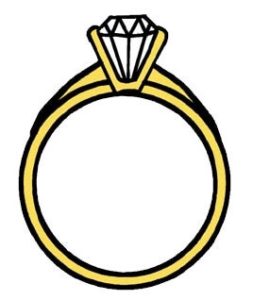Let’s talk about engagement rings. They come in all shapes and sizes.
Round, oval, emerald, cushion, pear, princess, radiant.
A half-carat. A whole carat. Even two or three or four carats.
They may be white gold, yellow gold, rose gold, sterling silver, or platinum.
However, no matter what they look like or how big they are, these rings are usually worn from the day of an engagement through every day thereafter. A ring is a visible, constant reminder of a couple’s relationship. Therefore, it is no surprise that when a relationship ends, and the time comes to remove that symbolic piece of jewelry, the question is always the same – “Well, what do I do with my engagement ring? What happens to it? Do I have to give it back?”
The answer? It generally depends on whether or not the marriage has taken place.
Under New Jersey law, an engagement ring is what is known as a “conditional gift.” The analysis is usually as simple as asking whether the “condition” – the marriage – has been fulfilled. If the marriage has taken place, then the condition has been fulfilled and the recipient of the engagement ring may keep it. If the engagement is broken off prior to a wedding, the condition has not been fulfilled and the ring must be returned.
This remains true regardless of fault. Unlike in most other states, a New Jersey court will not consider which party has broken the engagement or who is to blame for the relationship coming to an end.
This also remains the case regardless of the value of the ring. It does not matter if it is a very expensive ring, or unfortunately, Grandma’s heirloom ring – once the condition of marriage is fulfilled, the ring is usually the recipient’s to keep.
Interestingly, however, when determining whether a ring exchanged before a broken engagement should be returned, courts may consider whether the ring was given on a day customarily viewed as a gift-giving holiday – for instance, the recipient’s birthday, Valentine’s Day, Christmas, or Hanukkah – and whether the ring was intended to be a gift for that occasion or for the purpose of engagement. In those cases, the court will examine the intent of the person who offered the ring and the circumstances in which he or she presented the ring to the recipient.
Ultimately, if the court finds that a ring was intended to be a conditional gift, that the condition of marriage was not fulfilled, and the recipient refuses to return the ring, the court may order the return of the ring or financial redress for its value.
On the other hand (pun very much intended), once the marriage has taken place, the ring usually becomes the sole property of the recipient. Except in rare circumstances, it will not be subject to the property division process known as equitable distribution.
The question of whether or not a ring must be returned is one of the many questions that may arise when relationship troubles occur. At Paras, Apy & Reiss, P.C. we are happy to help guide you in any way we can. Just give us a ring.
The information in this article is not intended as legal advice. For legal advice, you should consult your attorney.

